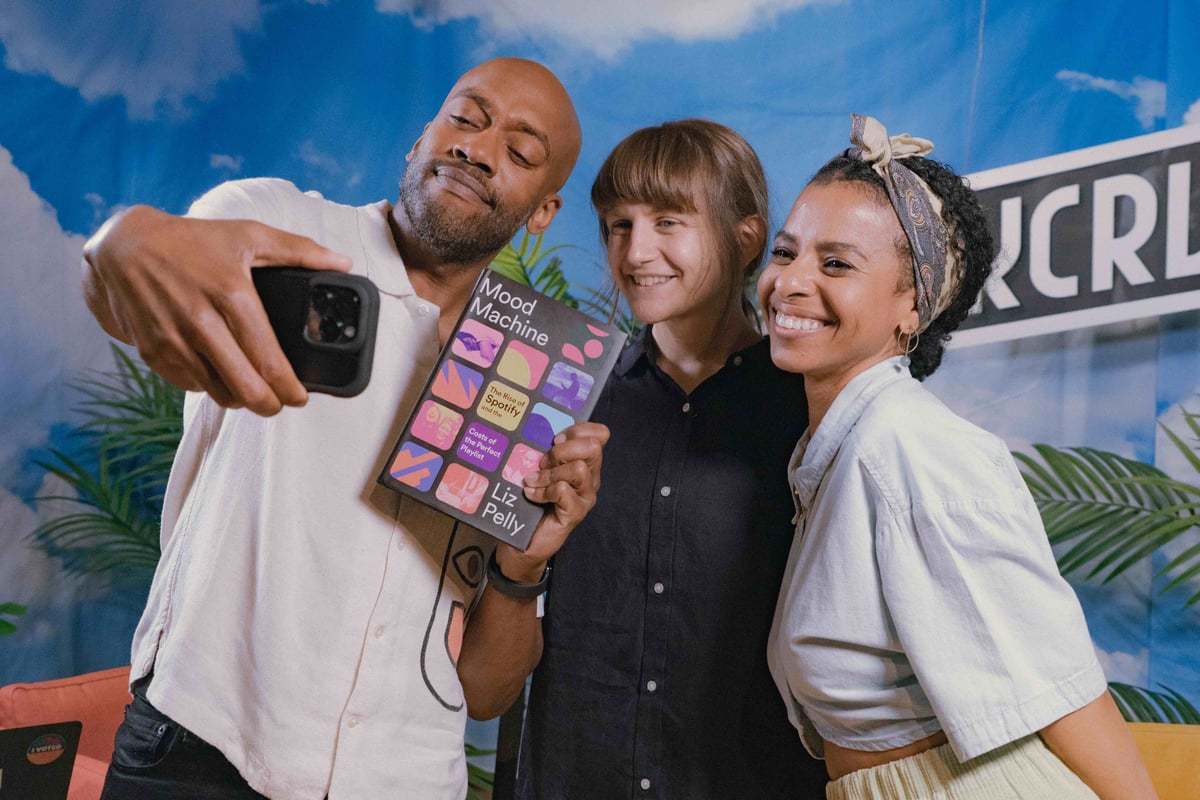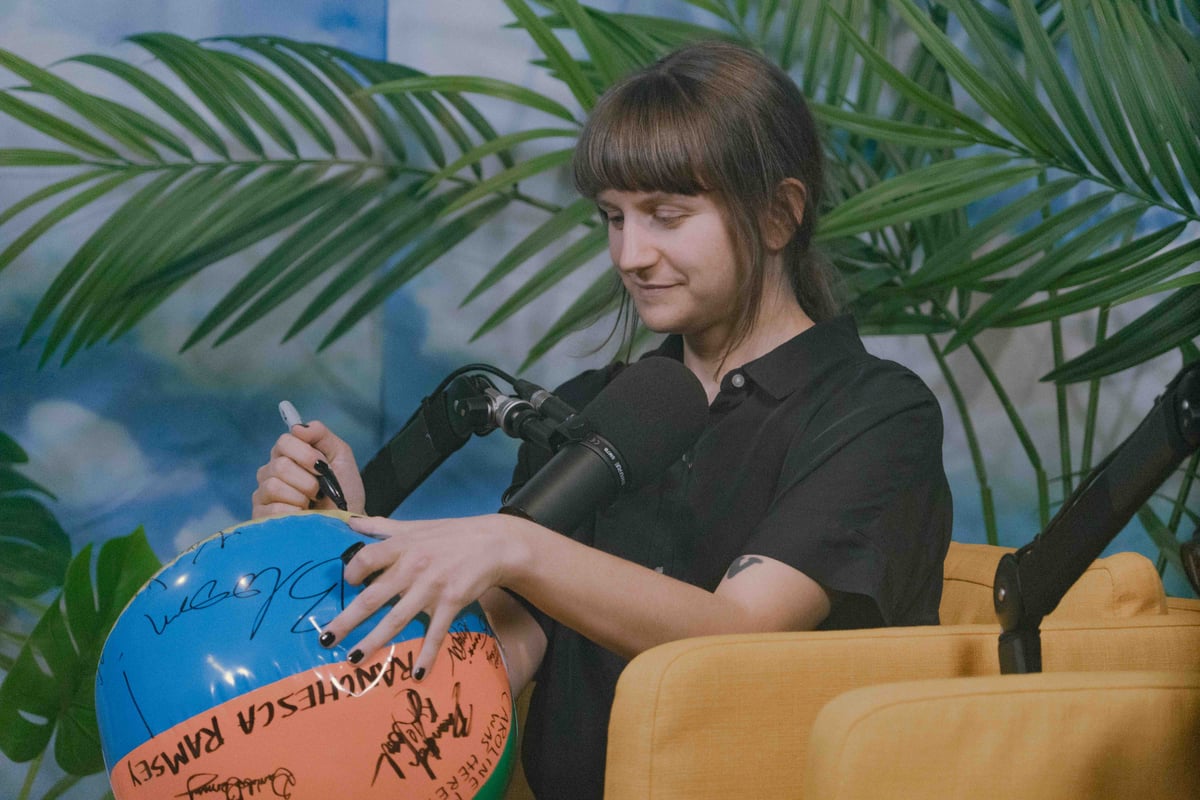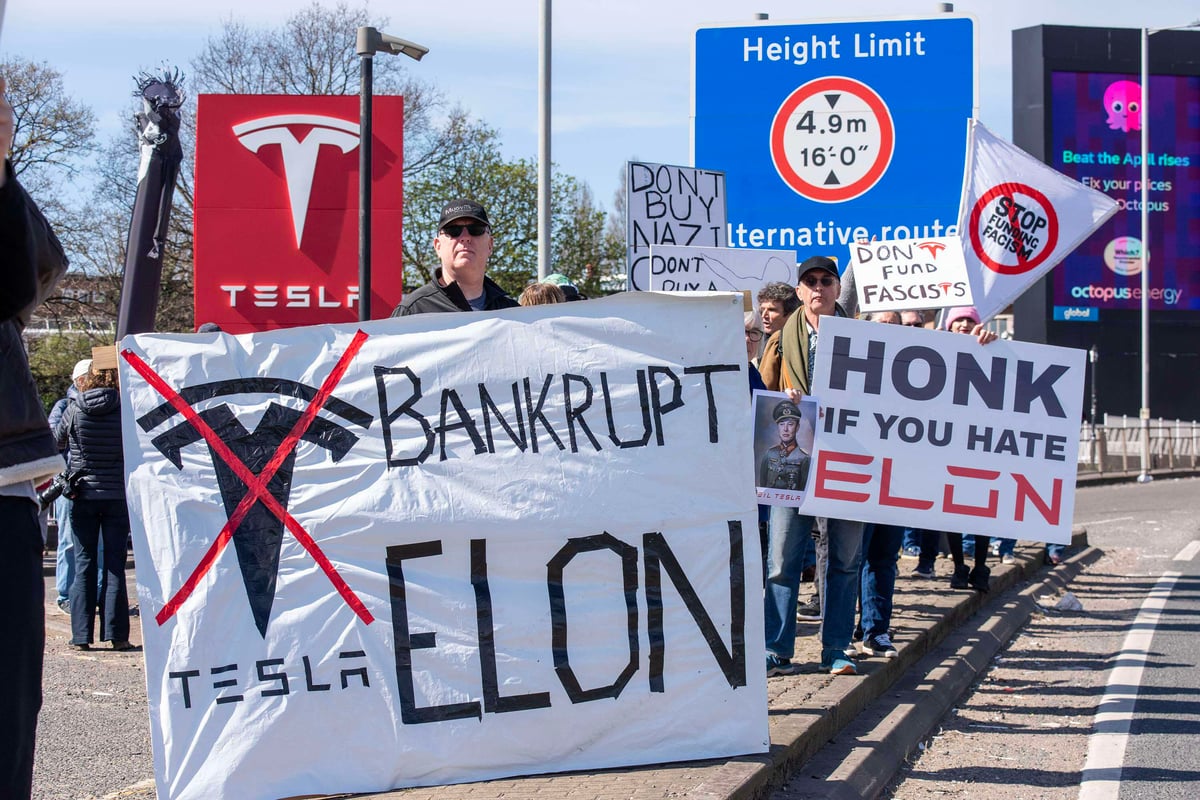If you had to give up Spotify, could you do it? And how hard would it be?
I’ve been asking myself these two questions over the last few months, as the streaming giant continues to encounter a litany of bad press. Spotify Wrapped now feels *washed*. Artists streaming on the platform still don’t make enough money (less than $0.005 per stream, to be precise). Spotify’s CEO Daniel Ek, on the other hand, makes TOO much money (last year he cashed out $345 million in shares, the equivalent of 115 billion streams)? The algorithm has gotten worse. The company has basically incorporated payola into its business strategy. And the home page experience is getting, well, pretty pushy. (Enough with the audiobooks! Please!)
It’s increasingly easy to find reasons to leave Spotify. And this week, I had an expert on the show — alongside KCRW DJ and Morning Becomes Eclectic host Novena Carmel — who maybe makes the best case. Her name is Liz Pelly, and she’s the author of a new book called Mood Machine: The Rise of Spotify and the Costs of the Perfect Playlist.
Pelly has spent years as an independent music journalist making Spotify her *beat,* researching the company and how it came to be, and being of the few reporters beyond the trades to consistently report on the impacts of its ascent. After a decade, she ended up with a sweeping thesis arguing that Spotify hasn’t just changed music forever — it has also degraded *the art form of music itself,* and perhaps even the meaning of being a fan.

Spotify, she tells me, is treating music less like art, and more like a utility, “like the water that you put on in your house … something you just, like, turn on the tap and it flows out, on demand.” Consuming music as Spotify intends – the endless stream, the background playlists based on mood or time of day, the neverending flow of songs from people you’ve never heard of and will never look up – Pelly says that strips out the artistic experience from the consumption of the art. You stop thinking about the music. You just use the music. And that’s not good.
She also argues that Spotify is making the music we hear less complex, and in some cases, even fake. Pelly went to great lengths to chronicle the process behind what she calls “ghost artists” on Spotify. It’s a practice in which Spotify, or companies working with Spotify, hire studio musicians to make a number of tracks all in one session, to populate various popular playlists on Spotify. These musicians are given examples of the sound desired, and are told to make their tracks not too complex or too stand-out-ey. And these artists often sign away their rights to royalties on these tracks, and the tracks often end up on Spotify under fake names, with artists who have fake bios. Populating popular playlists with songs made by these ghost artists means “real” artists get less in royalties.
When you take it all in, it’s… a lot. So. Question remains: Given all that I know now about this company, should I leave Spotify? Can I?
Every playlist I’ve made for the last decade or more lives on Spotify. Even as the algorithm on the app has gotten worse, it knows my music tastes better than any other human or machine. I move seamlessly on the app between music and podcasts. And I can’t imagine a day in which I do not rely on Spotify, several times.
Leaving would mean building up a whole new world of music on Apple or some other platform. And while people who study this stuff think other music apps are a little less problematic than Spotify, none of them are saintly. So what do I do?

Well, Pelly says maybe don’t quit Spotify just yet. “There's not like, one point in the book where I say everyone should delete their accounts,” she said in our interview, “because I'm a really big believer that calls for boycotts should come from organized groups of artists and unions and not from individuals.” She continued, “the problems raised by streaming are such big, systemic issues that sometimes pointing to these more individualistic solutions can feel a little bit shallow.”
Shallow or not, it does seem that America is in a boycott moment. Recent pushback against at least two major corporations has shown the power of financial protest: The so-called Tesla Takedown, launched in response to Elon Musk’s work with the White House and DOGE to dismantle large sectors of the federal government, has led to protests at Tesla dealerships across the country, declining sales of the company’s electric vehicles, and a near 40 percent drop in Tesla stock since December. And a boycott of Target after it dropped its DEI programming in the aftermath of Donald Trump’s election led to 10 percent fewer customers at the chain in February, and a stock drop of 24% as of March.
But so far, neither of these movements have realized the change they’re asking for. Elon Musk is still in DC, slashing the government. Target has not reinstated its DEI programs. It raises the question: Would people leaving Spotify get rid of ghost artists, or force the company to change its compensation rates for real artists? Would that type of change only come about through legislation? And how would we react to something like that?

Maybe not well. This past week, new legislation was enacted that would make parts of the music industry treat artists and fans more equitably. President Trump signed an executive order meant to end ticket price-gouging for live entertainment. It directs the Federal Trade Commision to work with the US Attorney General to “uphold price transparency throughout all stages of the ticket-buying process for consumers,” according to CNN. The bill calls for more and better enforcement of the already enacted Better Online Ticket Sales Act, which was passed in 2016. And the order builds on a similar movement from the Biden administration over the last few years, including a Biden rule that banned hidden “convenience” or “service” fees for concert tickets at checkout.
After Trump signed his executive order, the non-partisan National Independent Venue Association applauded the move. NIVA is the national trade association formed during the pandemic to represent the needs and challenges faced by independent live venues, festivals, and promoters. The group announced Trump’s executive order on its social platforms — preceded by a statement reiterating its nonpartisan stance and history of successful bipartisan policy efforts — expecting celebration from its followers. It received the opposite: so much backlash (in the comments) over seemingly supporting an action of the Trump administration that the group ended up deleting the post.

It all raises larger questions: What actions would affect the most positive and lasting change for artists, music workers, and music itself? Can the work still happen without including actors who otherwise don’t get along or agree politically? Do the solutions require cooperation that’s more difficult than just deleting an app? Does anyone really have the patience to figure this all out?
I have no answers to these large questions, but thankfully, Liz Pelly talked about what I can do now, in the meantime, even if none of these larger questions have answers at the moment.
There are some small things we all can do right now to make our music consumption better for the people who create it:
“Buying music directly from artists, whether it be directly through their websites, or through Bandcamp or merch at a show,” Pelly told me. “Having your own library of music that you maintain in addition to whatever other ways that you stream it … thinking about the media that you consume as well, not just in terms of how do you get money into the pockets of musicians, but also how do you discover music?”
And that might be as simple as looking at your streaming app every time a new song plays, reading the name of the song and the artist, making a mental note of who they are, and refusing to let anonymity rule your music experience. Streaming might be here to stay, but we can still value music as an art form, one song, or playlist, at a time.
– Sam